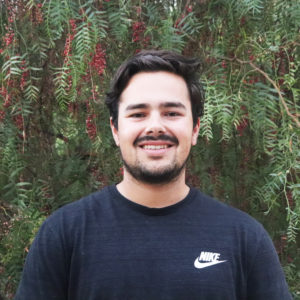
When Kulaea Tulua (sophomore) is not busy in class, playing on Occidental’s women’s basketball team or running with the women’s track and field team, she works in the athletic training room, helping the athletic trainers and student athletes stay healthy and heal from injuries.
This year, Tulua said she started work with the first athletes to arrive on campus during the summer. She checked in athletes for medical clearances and made sure they were signed in before seeing the athletic trainers. She also worked during the football team’s practice camp during the summer, setting up and making sure that all the necessary supplies were on the field.
“Our main goal is just to make things smoother for the athletic trainers,” Tulua said.

Cade Denyer (senior), a pitcher on Occidental’s baseball team, has been working in the training room since he was a sophomore. He is a kinesiology major and has been interested in sports medicine since he was in high school. Denyer said he loves that working with the athletic trainers allows him to learn more about athletic injuries and apply what he is learning in his kinesiology classes.
“The relationships I build with the team are really cool,” Denyer said. “I want to see the athletes succeed, and seeing someone coming back from an injury is really fulfilling.”
Tulua is a psychology major and public health minor, and she is interested in the psychological aspect of sports medicine, since the athletic trainer’s role focuses on both the physical and emotional health of athletes.
“I had surgery last year, and a lot of my rehab was about mentally getting over being scared of doing things again, and my trainer Lauren Wagner — love her — a huge part of what she did for me was pushing me to push myself mentally,” Tulua said. “I think that’s what really pulled me into wanting to apply for the job and wanting to work with the trainers that do that for other athletes.”
Katherine Drake (junior) is the self-proclaimed chronically injured goalkeeper of the women’s lacrosse team. Drake had knee surgery during her junior year of high school, and her doctors advised her not to run anymore, something she used to love to do.
Drake was originally recruited as a defender, but her health has not allowed her to play that role at Occidental. In her first year on the team, she was on the bench until the team’s goalie tore her anterior cruciate ligament (ACL) and had to stop playing entirely. Drake took on that position, and said by putting in a lot of hard work, she has grown into a well-trained goalie.
“I love trying new things, and we needed someone [to be goalie],” Drake said. “I guess if that hadn’t happened, I would have had to quit lacrosse and become a team manager or something, but I got to continue playing with for the women’s lacrosse program, which was really exciting.”
Julia Thompson (sophomore), a goalkeeper on the women’s soccer team, said rehabilitation can be a huge time commitment, especially if you are still healthy enough to go to practice. Thompson said an injury during Spring 2019 kept her in the training room for upwards of an hour each day in addition to her time in practice.
“A lot of time management skills definitely come into play, having to manage your homework with class and with practice and injuries is kind [of] hard,” Thompson said. “It’s definitely a lot of work, but it’s also super rewarding and fun.”
Although everyone on staff takes their jobs seriously, Tulua said the atmosphere in the training room is inviting, and athletic trainers laugh and joke with each other as they work. The athletic trainers pay close attention to the improvements that athletes show with their rehabilitation work, and athletes who spend a lot of time in the training room notice when other athletes improve as well.
Last year, Tulua spent a lot of her time in the training room with Zoe Nussbaum (sophomore), a member of the women’s lacrosse team. They bonded over their shared goals of rehabbing their injuries and both of them kept track of each others’ improvements, asked each other how they were feeling and cheered each other on. Tulua said her relationship with Nussbaum was especially important because her inability to work out hurt her ego and her identity as an athlete.
“Being in the training room and having to work so hard after getting injured is something that takes such a toll on you,” Tulua said. “To see another student in there, going through the same thing, and knowing that we’re both probably feeling the same type of hurt from not being able to play the sport that we love … it just reminded me that I wasn’t alone.”
![]()



































